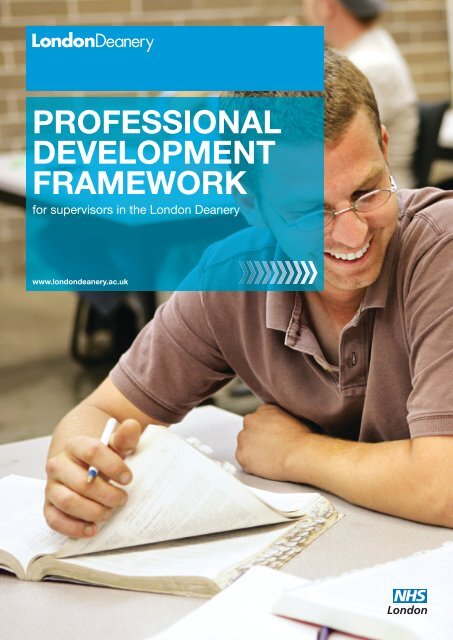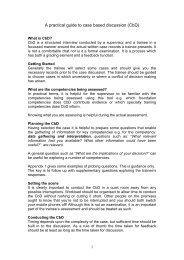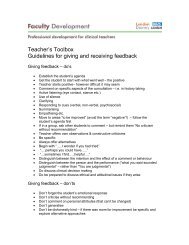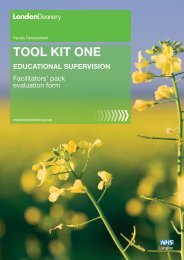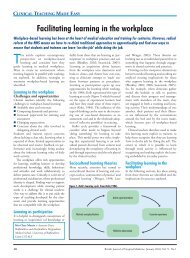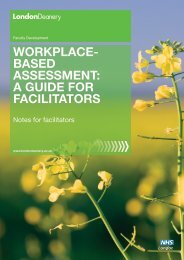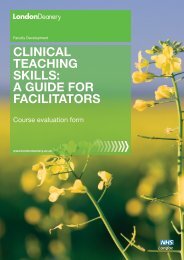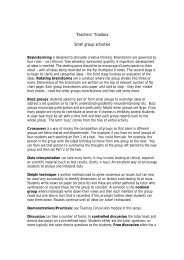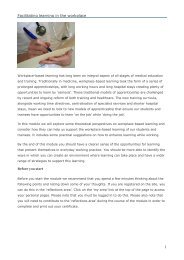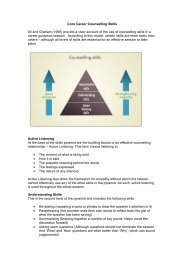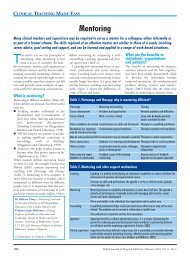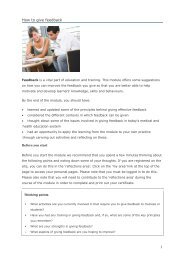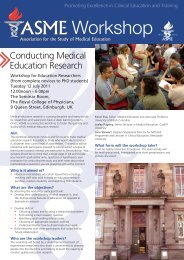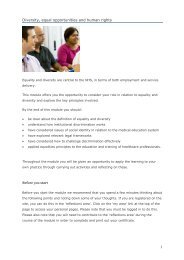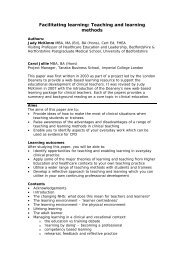PROFESSIONAL DEVELOPMENT FRAMEwORk - Faculty ...
PROFESSIONAL DEVELOPMENT FRAMEwORk - Faculty ...
PROFESSIONAL DEVELOPMENT FRAMEwORk - Faculty ...
- No tags were found...
Create successful ePaper yourself
Turn your PDF publications into a flip-book with our unique Google optimized e-Paper software.
<strong>PROFESSIONAL</strong><strong>DEVELOPMENT</strong><strong>FRAMEwORk</strong>for supervisors in the London Deanerywww.londondeanery.ac.uk
CONTENTS1 Executive summary1 Introduction2 Rationale2 Using the Framework3 Scope4 Definitions5 Relationship with other standards6 What scholarship supports this framework?7 The Framework in more detail15 Selection and reaccreditation of supervisors15 Mandatory training requirements for supervisors16 Content of mandatory training17 Requirements on Trusts and other local education providers18 Constructing local faculty development programmes19 Educational tariff guidance21 ReferencesAppendices22 A. Educational supervisor portfolio documentation29 B. Sample educational supervisor job descriptionVersion 1.2 (September 2010)For the most recent version of theProfessional Development Framework,supporting documentation, updatesand FAQs please visit www.faculty.londondeanery.ac.ukProfessional Development Framework for Supervisors in the London Deanery
EXECUTIVE SUMMARYThere are clear links between the quality of supervision and:• patient safety• enhanced quality of care• more rapid acquisition of trainee knowledge, skills and professional attitudes.The London Deanery Professional Development Framework applies to all those doctorsand dentists acting as clinical and educational supervisors working within Trusts andother local education providers within London. General practice and primary care dentaltrainers are governed by separate regulation.The Framework is intended to satisfy the Generic Standards for Training of the GeneralMedical Council (Postgraduate Medical Education and Training Board) and is to be usedto guide the selection and reaccreditation of supervisors and development of local facultydevelopment programmes in London Deanery Trusts.This Framework also includes a structured portfolio of evidence to support the Trustbasedaccreditation and professional development of educational supervisors.Guidance for Trusts on job planning, in the form of an educational tariff, is also provided.INTRODUCTIONThree interlinked trends in medical education; increasing accountability, professionalisationand the pursuit of ‘excellence’ have recently come together in a number of national policiesand regulations (Department of Health 2008a; Department of Health 2008b). These areencapsulated in the Postgraduate Medical Education and Training Board (PMETB)’s GenericStandards for Training which lay down the regulatory requirements for both training providersand trainers themselves (PMETB 2008).The seven areaswithin theFramework are:• ensuring safe and effectivepatient care• establishing and maintainingan environment for learning• teaching and facilitatinglearning• enhancing learning thoughassessment• supporting and monitoringeducational progress• guiding personal andprofessional development• continuing professionaldevelopment as an educatorIt is now essential for local education providers to demonstrate that those involved insupervision within their organisation have the necessary knowledge, skills and approachesto help develop and support trainees. In response to this national requirement, the LondonDeanery has developed a system and framework to enable Trusts and other providers toselect, train and accredit supervisors. The Framework also provides a vehicle for structuringpersonal educational development and a basis on which Trusts can plan their local facultydevelopment provision. Compliance with the London Deanery Professional DevelopmentFramework will be monitored through the London Deanery quality management processes.This Framework describes:• a structure for the professional development of clinical and educational supervisors in theLondon Deanery• London Deanery requirements for the selection and accreditation of supervisors• guidance on educational roles• guidance on the number of programmed activities (PAs) to be used to inform jobplanning• sample portfolio documentation for the accreditation of educational supervisors.Professional Development Framework for Supervisors in the London Deanery1
RationaleWhy produce a Professional Development Framework for Supervisors?A number of frameworks already exist to guide the professional development of clinicalteachers, such as that most recently provided by the Academy of Medical Educators(2009). However, as Kilminster and her colleagues (2007) have highlighted “effectivesupervision of trainees involves skills that are different from other more generalcompetencies expected of a teacher or trainer”.The PMETB Generic Standards for Training (2008) has articulated standards forsupervisors thus providing the regulatory benchmark. But London has an aspiration tobe ‘PMETB-plus’, aiming for quality enhancement, rather than just quality control to athreshold. In describing a set of standards and processes that are developmental, ratherthan purely credentialing, and which specify criteria for excellence as well as minimumstandards, we hope to develop supervisory practice within London to a point where wecan deliver our aim to provide ’world-class education for world-class healthcare’ (LondonDeanery 2008).This aspiration is echoed in A High Quality Workforce: NHS Next Stage Review(Department of Health 2008a) which outlines the Department of Health’s intention toensure that “educational supervisors in secondary care undergo mandatory training andreview of their performance for the role”.USING THE FRAMEWORKThis framework may be used to guide the:• selection and reaccreditation of educational supervisors• development of local faculty development programmes.In spelling out the behaviours of both ‘effective’ and ‘excellent’ supervisors we wish toencourage a move away from ‘courses undertaken’ to a demonstration of ‘competencesobtained’. In doing so, we also recognise the diversity of skills, experience and priortraining that supervisors in London bring to their roles.There are seven areas in the London Deanery’s Professional Development Frameworkfor Supervisors. All seven areas are to be used in the accreditation of those with arole involving educational supervision. Sections of the Framework (areas 1–4) mayalso be used to guide faculty development programmes for consultants and otherpractitioners involved solely in clinical supervision (i.e. with no formal ongoing educationalresponsibility) and for specialty registrars as they develop educational competencies inthe course of their training programmes.2 Professional Development Framework for Supervisors in the London Deanery
SCOPEThe Framework applies to all those doctorswith a designated supervisory role workingwithin Trusts and other local educationproviders within London.Trainers in general practice and primarycare dentistry are governed by separateregulation.What this is not is a comprehensiveand generic set of attributes of medicaleducators. These are provided elsewheresuch as by the Academy of MedicalEducators (www.medicaleducators.org). Neither does the Frameworkconstitute a job description for doctorsworking within a specific institutionalthough a sample job description for aneducational supervisor is provided in theAppendix.Where a doctor’s educational role extendsbeyond supervision in the workplace e.g.training programme director, universitylecturer s/he is encouraged to seekaccreditation through the Academy ofMedical Educators or Higher EducationAcademy. Accreditation through eitherof these bodies will constitute significantevidence that the standards within therelevant sections of the Framework havebeen met.Professional Development Framework for Supervisors in the London Deanery3
DEFINITIONSThe precise roles of clinical supervisor and educational supervisor vary from site-tositeand specialty-to-specialty. But as educational activities, clinical and educationalsupervision are quite distinct (Department of Health 2009, Kilminster 2007, Launer 2006).Here they are considered alongside PMETB’s recently published role definitions (PMETB2009).Clinical supervision relates to day-to-day oversight of trainees in the workplace andis an activity that involves all clinicians that come into contact with trainees. Clinicalsupervision involves being available, looking over the shoulder of the trainee, teachingon-the-job with developmental conversations, regular feedback and the provision of arapid response to issues as they arise. All trainees should have access to supervisionat all times with the degree of supervision tailored to their competence, confidence andexperience. Within a given training placement, and for each trainee, such arrangementsmay be the responsibility of a nominated ‘clinical supervisor’.PMETB defines a clinical supervisor as ‘a trainer who is selected and appropriatelytrained to be responsible for overseeing a specified trainee’s clinical work and providingconstructive feedback during a training placement. Some training schemes appointan Educational Supervisor for each placement. The roles of Clinical and EducationalSupervisor may then be merged’.Educational supervision relates to the oversight of a trainee’s progress over time.Educational supervisors are responsible for ensuring that trainees are making thenecessary clinical and educational progress. Educational supervisors will need all theskills of clinical supervision, plus an appreciation of supporting educational theory, theability to undertake appraisal, work with portfolios and provide careers advice. Managingthe trainee in difficulty will also, inevitably involve the educational supervisor with supportfrom deanery training structures.PMETB defines an educational supervisor as ‘a trainer who is selected andappropriately trained to be responsible for the overall supervision and managementof a specified trainee’s educational progress during a training placement or series ofplacements. The Educational Supervisor is responsible for the trainee’s EducationalAgreement.’Note that in both instances PMETB requires the supervisor to be ‘selected andappropriately trained’.Supervisors (and Trusts) should be clear about which of these activities they are engagedin and to communicate this clearly to trainees for whom they are responsible.Supervisors will normally be expected to hold consultant status within the Trust althoughit may be appropriate during Foundation stages of training for staff and associatespecialists to act as clinical or educational supervisors.4 Professional Development Framework for Supervisors in the London Deanery
Relationship with other standardsThe London Deanery Professional Development Framework derives directly from thePMETB Generic Standards for Training (PMETB 2008). The table below demonstrateshow the two frameworks map onto each other.PMETBGeneric standards for training 6.25 6.26 6.27 6.28 6.29 6.30–6.33 6.34 6.35London DeaneryProfessional Development Framework 1,2 2,3,7 5,6 2,3 2,3 N/A* 5,7 5,7*PMETB Standard 6.3 relates to systems of faculty development, rather than the attributes of individuals, and isdealt with in the Requirements on Trusts section of this document and elsewhere in the London Deanery’s qualitymanagement processes.The London Deanery has previously set out a minimum training specification forsupervisors which aimed to provide guidance to individuals and education providers asto what would constitute an adequate initial training (London Deanery 2008). Those thathave already followed this guidance should satisfy the requirements of this framework.The role of some supervisors extends across Deanery boundaries either because theyare working in Trusts outside London supervising trainees on London programmes, orbecause they are based in London Trusts supervising trainees that ‘belong’ to otherdeaneries. In these cases, the rules of engagement are quite clear. Supervisors areexpected to comply with the requirements of the Deanery with whom that Trust holdsan educational contract. Normally this would mean that supervisors in London Trustsare subject to London regulations. A joint statement from London and KSS Deaneriesdetailing this arrangement for Kent, Surrey and Sussex and the South London Foundationprogramme is to be found at www.faculty.londondeanery.ac.uk.Many supervisors in London also work within the university sector, some of whommay have already obtained accreditation through the Higher Education Academy. TheAcademy of Medical Educators provides a similar route to those working specifically inmedical education. The London Deanery Framework takes account of both these formsof accreditation so as to make application processes for individuals more streamlined andconsistent. Indeed, where a doctor’s educational role extends beyond just supervision inthe workplace e.g. training programme director, university lecturer, s/he is encouraged toseek accreditation through one or other of these routes.Finally, it should be noted that the General Medical Council’s code of professionalconduct contains a section entitled ‘Teaching and learning, appraising and assessing’.In relation to this section of Good Medical Practice (General Medical Council 2001) it isenvisaged that accreditation through the London Deanery Professional DevelopmentFramework will more than satisfy the requirements for revalidation.Professional Development Framework for Supervisors in the London Deanery5
What scholarship supports thisframework?A review of the empirical evidence (Kilminster S et al 2007) clearly demonstrates a linkbetween supervision and:• patient safety• enhanced quality of care• more rapid acquisition of trainee knowledge, skills and professional attitudes.There is also a small but growing body of evidence that the development of the localclinical educational faculty makes a significant difference to the professional progressionof trainees. Further supporting evidence will be signposted on the ProfessionalDevelopment Framework section of the London Deanery website.See www.faculty.londondeanery.ac.ukIn addition to the documents already discussed above, a number of key papers haveinformed this Framework, namely;Copeland HL, Hewson M (2000) Developing and testing an instrument to measure theeffectiveness of clinical teaching in an academic medical center AcadMed 75(2)161-166Harden RM, Cosby J (2000) AMEE Guide #20 The good teacher is more than alecturer – the twelve roles of the teacher MedTeach 22:334-347Hesketh E et al (2001) A framework for developing excellence as a clinical educatorMedEd 35:555-564Kilminster S, Jolly B (2000) Effective supervision in clinical practice settings MedEd34:827-840Kilminster S et al ( 2007) AMEE Guide #27 Effective educational and clinicalsupervision. MedTeach 29:2-19.Wall D, McAleer S (2000) Teaching the consultant teachers: identifying the corecontent MedEd 34:131-138A number of professional, regulatory and educational standards have also informedthis Framework, notably the Professional Development Standards of the Academy ofMedical Educators (2009), the Northern Deanery – <strong>Faculty</strong> Development CurriculumFramework (2008), the UK Standards for Dental Educators (Committee of PostgraduateDental Deans and Directors 2008) and the Nursing and Midwifery Standards for Mentors,Practice Teachers and Teachers (2008).6 Professional Development Framework for Supervisors in the London Deanery
London Deanery ProfessionalDevelopment Framework AreasThe Framework is designed around sevenkey areas of activity, all of which relateto the role of the postgraduate medicalsupervisor. The precise emphasis onindividual areas will vary depending onthe supervisory role, areas five and six forinstance, are more relevant to educationalthan clinical supervisors.Each section of the Framework contains:• description of the area• expectations of effective supervisors• hallmarks of excellence• examples of evidence that maybe provided for the purposes ofaccreditation.The Framework is underpinned by thecore professional values expressed inGood Medical Practice (General MedicalCouncil 2001) which apply to all doctors,including supervisors. The values andresponsibilities set out in Good MedicalPractice are not reiterated here but theattention of supervisors should be drawnto the specific paragraphs of GoodMedical Practice under the heading‘Teaching and training, appraising andassessing’.The seven framework areas are shown.Ensuring safe and effective patient careEstablishing and maintaining an environment for learningTeaching and facilitating learningEnhancing learning through assessmentSupporting and monitoring educational progressGuiding personal and professional developmentContinuing professional development as an educatorProfessional Development Framework for Supervisors in the London Deanery7
1. Ensuring safe and effectivepatient careThis area is about how you protect patients and enhance their care throughyour supervision of doctors in training, and how you balance the needs of yourpatients and service with the educational needs of your trainees.The effective supervisor• Balances the needs of service delivery with education• Acts to ensure the health, wellbeing and safety of patients atall times• Ensures that trainees have undertaken appropriate induction• Allows trainees, when suitably competent, to takeresponsibility for care, appropriate to the needs of the patient• Ensures that trainees understand the importance of providingculturally competent careThe excellent supervisor Also• Uses educational interventions to enhance patient care• Involves trainees in service improvement• Involves patients as educatorsExamples of relevant evidence• Courses attended or programmes undertaken including face to face and online learning• GMC (PMETB) trainee survey results or equivalent• Feedback from patients about care received• Details of measures put in place to ensure supervision appropriate to trainee’s competence and confidence• Trainee audits, examples of topics critically appraised by trainees• Examples of near miss/critical incident analysis8 Professional Development Framework for Supervisors in the London Deanery
2. Establishing and maintaining anenvironment for learningThis area is about how you make the clinical environment safe and conducive toeffective learning for trainees and others.The effective supervisor• Encourages participation through provision of equality ofopportunity and acknowledgement of diversity• Ensures that trainees receive the necessary instruction andprotection in situations that might expose them to risk• Encourages and maintains the confidence of trainees• Is open, approachable and available• Maintains good interpersonal relationships with trainees andcolleagues• Provides protected time for teaching and learning• Involves the multiprofessional team in the delivery of teachingand supervision• Is aware of the team’s experience and skills relating toteaching and supervision• Ensures that workload requirements on trainees are bothlegal and that wherever possible, they do not compromiselearning• Makes provision for the specific training needs of traineeswith disabilitiesThe excellent supervisor Also• Proactively seeks the views of trainees on their experience• Takes steps to establish a learning community within theirdepartment and/or organisation• Monitors, evaluates and takes steps to address areas forimprovement in teaching and learningExamples of relevant evidence• Courses attended or programmes undertaken, including face to face and online learning• GMC (PMETB) trainee survey results or equivalent• Other feedback from trainees• Details of learning programmes, study schedules, timetables for trainees and clinical teachers• Feedback from colleaguesProfessional Development Framework for Supervisors in the London Deanery9
3. Teaching and facilitating learningThis area is about how you work with trainees to facilitate their learning.The effective supervisor• Has up-to-date subject knowledge and/or skills• Provides direct guidance on clinical work where appropriate• Has effective supervisory conversational skills• Plans learning and teaching episodes• Uses a range of appropriate teaching interventions in theclinical setting• Facilitates a wide variety of learning opportunities• Helps the trainee develop an ability for self-directed learning• Allows the trainee to make contributions to clinical practiceof graduated value and importance commensurate with theircompetence• Uses technology enhanced learning where appropriatee.g. simulation• Encourages access to formal learning opportunitiese.g. study daysThe excellent supervisor Also• Demonstrates exemplary subject knowledge or skills• Understands and can apply theoretical frameworks to theirpractice• Is involved with curriculum development beyond thesupervisory relationship• Works with the department and/or provider to ensure a widerangeof learning opportunities is available e.g. simulationfacilities, coursesExamples of relevant evidence• Courses attended or programmes undertaken, including face to face and online learning• GMC (PMETB) trainee survey results or equivalent• Other feedback from trainees• Details of learning programmes, study schedules and timetables for trainees• Feedback from colleagues• Evidence of recent initiatives to enhance the provision of learning opportunities10 Professional Development Framework for Supervisors in the London Deanery
4. Enhancing learning throughassessmentThis area is about your approach to assessment and feedback.The effective supervisor• Regularly observes the trainee’s performance and offersfeedback• Plans and/or monitors assessment activities• Uses workplace-based assessments appropriately• Provides feedback that is clear, focussed and aimed atimproving specific aspects of trainee performance• Ensures that the trainee participates in 360° appraisal• Supports the trainee in preparation for professional externalexaminationsThe excellent supervisor Also• Demonstrates exemplary subject knowledge or skills• Understands and can apply theoretical frameworks to theirpractice• Is involved with curriculum development beyond thesupervisory relationship• Works with the department and/or provider to ensure a widerangeof learning opportunities is available e.g. simulationfacilities, coursesExamples of relevant evidence• Courses attended or programmes undertaken, including face to face and online learning• GMC (PMETB) trainee survey results or equivalent• Other feedback from trainees• Details of programmes, study schedules and timetables for trainees indicating assessment modes, patterns and relevanceto learning• Feedback from peers, e.g. relating to external examining or professional assessmentProfessional Development Framework for Supervisors in the London Deanery11
5. Supporting and monitoringeducational progressThis area is about the support you provide to trainees in their progressiontowards a Certificate of Completion of Training and their intended careerdestination.The effective supervisor• Agrees an educational contract at the outset of the training period• Understands the curricula requirements of the Specialty andstage of training• Identifies learning needs and sets educational objectives• Involves the trainee in the above processes• Reviews and monitors progress though regular timetabledmeetings• Ensures that appropriate records are kept in relation totrainee progress• Uses the educational portfolio appropriately and encouragesits use by trainees• Provides continuity of supervision or ensures effectiveeducational handover• Responds efficiently and effectively to emerging problems oftrainee progress• Is aware of, and can access available support for the traineein difficulty• Understands their role and responsibilities within theeducational governance structures of their local educationprovider, Deanery and College• Provides reports for Annual Review of CompetencyProgression (ARCP) panels and responds appropriately topanel outcomesThe excellent supervisor Also• Proactively seeks out opportunities for providing formalsupport and career development activities for trainees• Establishes and/or evaluates schemes for monitoring traineeprogress across the department/organisation• Involves themselves in external activities relevant to doctorsin difficulty or career progression (e.g. ARCP panels, GMC,GDC or college committees)Examples of relevant evidence• Courses attended or programmes undertaken, including face to face and online learning• GMC (PMETB) trainee survey results or equivalent• Other feedback from trainees• Examples of meetings, records of trainee progress and learning plans (anonymised)• Case studies of the management of a trainee in difficulty (anonymised)• Feedback from peers, e.g. relating to involvement in organisational/professional activities12 Professional Development Framework for Supervisors in the London Deanery
6. Guiding personal and professionaldevelopmentThis area is about the support you provide to trainees in relation to theirpersonal and professional development.The effective supervisor• Provides a positive role model• Has effective supervisory conversational skills• Utilises a range of skills and techniques relevant to personaland professional development• Is able to set and maintain appropriate boundaries• Understands when and where to refer on to other agencies,e.g. occupational health, counselling, MedNet, DeaneryCareers Unit• Ensures that the trainee is aware of the requirements of, andparticipates in NHS Appraisal• Ensures that the trainee participates in 360° appraisalThe excellent supervisor Also• Demonstrates exemplary subject knowledge or skills• Understands and can apply theoretical frameworks to theirpractice• Is involved with curriculum development beyond thesupervisory relationship• Works with the department and/or provider to ensure a widerangeof learning opportunities is available e.g. simulationfacilities, coursesExamples of relevant evidence• Courses attended or programmes undertaken, including face to face and online learning• GMC (PMETB) trainee survey results or equivalent• Other feedback from trainees• Examples of meetings, records, case studies (suitably anonymised)• Examples of support, challenge and careers guidance provided to trainees (anonymised)• Feedback from peersProfessional Development Framework for Supervisors in the London Deanery13
7. Continuing professional developmentas an educatorThis area is about your own professional development as a medical educator.The effective supervisor• Evaluates own supervisory practice• Evaluates own practice as an educator• Takes action to improve own practice on the basis offeedback received e.g. appraisal, informal feedback• Maintains professional practice in line with specialty andregulatory requirementsThe excellent supervisor Also• Actively seeks the views of colleagues through e.g. 360°appraisal, peer observation• Engages in programmes of educational development e.g.training the trainers courses, postgraduate certificates,Masters programmes• Assists in the development of others as educators includingtraineesExamples of relevant evidence• Courses or programmes recently undertaken, including face to face and online learning• Results of 360° appraisal• Certificates or qualifications obtained• Critical comments on relevant books or articles read recently• Results of peer review or professional observation of teaching• Keeps up to date on specific specialty and/or Foundation training requirements14 Professional Development Framework for Supervisors in the London Deanery
Selection and reaccreditationof supervisorsFrom January 2010, the London Deanery expects all Trusts to have implementedmandatory training and a developmental system of three-yearly appraisal and review of alleducational supervisors against a Deanery-wide framework.The Deanery expects all existing educational supervisors (as defined above) to be selectedfor their role, participate in a three-yearly educational review process and demonstrate thatthey have undertaken training in the appropriate areas of the Framework.All existing clinical supervisors (as defined above) are required to have been selectedand appropriately trained. Participation in a three-yearly review process is not currentlyrequired although this is likely to be extended to clinical supervisors in the near future.All new educational or clinical supervisors are expected to have undertaken mandatorytraining in the areas described below before being selected for their role.Mandatory training requirementsfor supervisorsThe London Deanery recognises that supervisors will choose to access training from avariety of sources such as through Royal Colleges, e-learning and undergraduate staffdevelopment programmes. Regardless of how or when training was undertaken, it isexpected that the areas to be covered should be those listed in the following section.For educational supervisors mandatory training covers all areas of the Framework.Once undertaken, it is not necessary to repeat this training although educationalsupervisors are expected to demonstrate an ongoing commitment to theirdevelopment as a medical educator through participation in a three-yearly cycleof review.For clinical supervisors mandatory training covers selected areas (1–4) of theFramework. Once undertaken, it is not necessary to repeat this training althoughclinical supervisors are encouraged to demonstrate an ongoing commitment totheir development as a medical educator through participation in a three-yearlycycle of review although this is not currently a mandatory requirement.All trainees in London programmes are required to have undertaken trainingsufficient to equip them to be an effective clinical supervisor by the time ofcompletion of specialty training. Implementation to be determined by specialtyschools subject to curricula requirements.In addition, the London Deanery expects that all supervisors should refresh theirtraining in equal opportunities and diversity every three years and those involved in therecruitment process should be trained in interview and/or selection skills.Professional Development Framework for Supervisors in the London Deanery15
Content of mandatory trainingThe areas defined in the London Deanery Professional Development Framework areto guide the development of all consultant supervisors in the London Deanery area. Arecommended outline curriculum for mandatory training is mapped below to the sevenFramework areas. Training undertaken and faculty development programmes shouldcover these topics.1. Ensuring safe and effective patient care• Balancing the needs of service delivery with education• Allowing trainees, when suitably competent, to take responsibility for care,appropriate to the needs of the patient• Developing appropriate induction2. Establishing and maintaining an environment for learning• Creating a learning environment• Identifying and planning learning opportunities• Dealing with diversity and providing equality of opportunity (update requiredthree-yearly)3. Teaching and facilitating learning• Assessing learning needs• Using a variety of methods to deliver the curriculum• Skills teaching• Developmental conversational skills e.g. supervision, mentoring, coaching4. Enhancing learning through assessment• Principles of workplace-based assessment• Use of commonly used tools e.g. mini-CEX, MSF• Giving effective feedback5. Supporting and monitoring educational progress*• Setting and reviewing learning objectives• Purpose and processes of portfolios• Annual review of competence progression• Identification, diagnosis and management of the trainee in difficulty6. Guiding personal and professional development*• Personal development planning• Career guidance and advice7. Continuing professional development as an educator• Specific specialty and/or Foundation training requirements*educational supervisors only16 Professional Development Framework for Supervisors in the London Deanery
Requirements on Trusts and other localeducation providersFrom January 2010, all educational supervisors must be selected and accredited fortheir role against the London Deanery Framework areas on a regular three-yearly cycleof review.There is no ‘one size fits all’ but the outcomes of local processes are expected to be that:1. A database of all nominated clinical and educational supervisors is established andmaintained by the Trust or local education provider. This must include a record oftraining undertaken, accreditation date and recommendations made with regard tofuture development.2. Annual reporting to London Deanery on all supervisors within the Trusts theirtraining and accreditation status.3. A process of portfolio-based accreditation for educational supervisors is establishedwith a rolling three-yearly cycle of review.4. The accreditation/reaccreditation process is carried out against the LondonDeanery Professional Development Framework.5. The process must be linked to a review of results from the GMC (PMETB) traineesurvey or equivalent where available.6. The process must be developmental i.e. it must incorporate identification of needsfor further development as an educator in the form of a personal development plan.7. The review will also result in a formal statement of accreditation from the Director ofMedical Education (or nominated deputy or equivalent) including a recommendationin relation to the supervisor’s educational workload in accordance with theDeanery’s educational tariff. This recommendation should be in the form that it canbe carried forward as a basis for negotiation in the annual consultant job planningprocess.8. A clear and transparent selection process is established for all new clinical andeducational supervisors. Educational supervisors would normally be expected tosubmit an evidenced portfolio to the Director of Medical Education (or nominateddeputy or equivalent) before taking on their role.9. In the roll out phase of the Framework in 2009, existing supervisors were accreditedon the basis of their past experience (‘grandfathered’) for a maximum of threeyears. From January 2010, all educational supervisors must participate in the localreview process when called.10. Trusts and other local education providers must provide an ongoing programmeof faculty development in accordance with the identified development needs of alleducators within the Trust or provider.11. Provided the above outcomes are achieved, Trusts may develop their ownadministrative processes. A sample London Deanery portfolio is provided togetherwith suggestions for implementation.12. Trusts and other local education providers will be required to demonstrate thatthey are meeting the requirements of the Professional Development Frameworkfor Supervisors as an integral part of the London Deanery’s routine qualitymanagement processes.Professional Development Framework for Supervisors in the London Deanery17
Constructing local faculty developmentprogrammesRolling programmes of faculty development must be provided within each Trust toenable clinical and educational supervisors to meet the mandatory training requirementsdescribed above.<strong>Faculty</strong> development though should be an iterative process, enabling clinical teachersto reflect and to receive feedback on their teaching and supervision. It is not a one-off‘sheep dip’ exercise. Local faculty development programmes should facilitate supportand development through, for example the provision of advanced programmes forexperienced educators, mentoring and supervision support, and the additional contentof local faculty development programmes should meet the training needs of supervisorsidentified through the three-yearly cycle of review.Supervisors who wish to pursue their educational development in more depth are advisedto consider enrolling on a university-accredited course such as the MA in Clinical Educationat the Institute of Education (www.ioe.ac.uk) or through short courses, reflectionson work-based experience and self-directed learning, and subsequent professionalaccreditation through the Academy of Medical Educators (www.medicaleducators.org).In future years, it is envisaged that the professional standards for ‘faculty’ will continueto rise to the level that exists in general practice, where potential trainers undertake amodular Postgraduate Certificate teaching programme before applying to train.Advice on design and delivery of faculty development programmes can be obtainedthrough the <strong>Faculty</strong> Development Unit of the London Deanery. The <strong>Faculty</strong> DevelopmentUnit also provides a suite of open-access e-learning modules supporting all aspects ofthe Framework.www.faculty.londondeanery.ac.uk18 Professional Development Framework for Supervisors in the London Deanery
Educational tariff guidanceThis guidance should be read in conjunction with the definitions provided earlier.Postgraduate medical education has changed dramatically in the last few years andin line with increasing accountability found across the public sector, there are greaterexpectations than ever on consultant trainers. From 2010 the Postgraduate MedicalEducation and Training Board, requires that ‘trainers must...have a suitable job plan withan appropriate workload and time to develop trainees’. It is therefore now an expectation,as laid out in the London Deanery educational contract with Trusts that appropriate timefor training is allocated within an individual consultant’s job plan. This will be monitored aspart of the Deanery’s routine quality and contract monitoring processes.Educational supervisor0.25 PA per week per traineeCommentThis would usually be planned as part of supporting programmed activity (SPA) time.However, a consultant’s workload might be such that additional programmed activities(PAs) are required or time is found within clinical activities. Trainers with an educationalsupervision role will be expected to demonstrate their competence through participationin the three-yearly cycle of educational review described in the ‘Requirements on Trusts’section of this document.In the interests of clarity, the Director of Medical Education (or nominated deputy orequivalent) within each Trust will make a formal recommendation for consultants to takeforward to the job planning process based on the tariff below. This will be subject to, andan outcome of successful participation in the educational review process. Please notethat this is not a guarantee that additional PAs will be made available – ultimately this is amatter for negotiation between employee and employer – but it is the London Deanery’sview that these are reasonable expectations that meet national requirements.Clinical supervisor0.25 PA per week (maximum) independent of number of traineesCommentClinical supervision entails no longitudinal relationship with trainees, and as such isalready a requirement of consultants under Good Medical Practice. Participation inthe three-yearly review process is optional but to be encouraged. The ProfessionalDevelopment Framework should be used to guide faculty development programmes forthis group of trainers.Training programme director1 PA per week (minimum) per 40 traineesCommentThe role of the training programme director is defined in the ‘Gold Guide’ (Department ofHealth 2008) paragraphs 4.12–4.14. GMC (PMETB) requires that training programmesare led by programme directors who have responsibility for the management of bothtrainees and their programmes. Funding for training programme directors is sent directlyto Trusts from the London Deanery. Programme directors overseeing certain groups oftrainees may attract a higher rate of remuneration.Professional Development Framework for Supervisors in the London Deanery19
Foundation programme director1 PA per week (minimum) per 30 traineesCommentThe foundation training programme director is responsible for the overall managementand quality control of a Foundation Programme that consists of 20-40 placementsdesigned for foundation training across the local health economy. Funding for the supportof foundation training is sent directly to Trusts from the London Deanery on a per traineebasis and may be used flexibly by Trusts.College or specialty tutorCommentThe London Deanery does not hold a view on the job planning requirements of College orspecialty tutors as their role and level of involvement in local education varies from Trustto Trust and across specialties. Increasingly though, tutors may find themselves playingan important part in the selection and reaccreditation of educational supervisors and willnormally be accountable to the Director of Medical Education.Director of Medical Education/Clinical Tutor3–5 PAs per weekCommentDirectors of Medical Education and Clinical Tutors will hold a Trust job description andtime for the role will be allocated within the agreed job plan. A generic job description isavailable from the National Association of Clinical Tutors. Historically, Clinical Tutors andDirectors of Medical Education were dually funded by Trust and Deanery although theseposts, and associate positions, have recently been handed over to fall underTrust management.Other educational tasksCommentFrom time to time consultants will be required to participate in other educational activitiessuch as attendance at specialty training or School committee meetings, Deanerymeetings, participation in recruitment episodes and other Trust-based educationalactivities such as teaching or facilitation in simulation centres. It is not possible to provideblanket guidance around these many and diverse educational responsibilities and theseelements of an individual’s role should be allocated time in the job plan by individualnegotiation.20 Professional Development Framework for Supervisors in the London Deanery
ReferencesAcademy of Medical Educators (2009) Professional Standards Retrieved 4th January 2010, fromwww.medicaleducators.orgCommittee of Postgraduate Dental Deans and Directors (2008). Guidelines for Dental Educators. Retrieved 14thAugust 2008, from www.copdend.org.ukCopeland HL, Hewson M (2000) Developing and testing an instrument to measure the effectiveness of clinicalteaching in an academic medical center AcadMed 75(2)161-166Department of Health (2007) Operational framework for foundation training Retrieved 1st September 2008, fromwww.foundationprogramme.nhs.ukDepartment of Health (2008a) A High Quality Workforce: NHS Next Stage Review. London, Department of Health.Department of Health (2008b) A Reference Guide for Postgraduate Speciality Training in the UK (‘Gold Guide’),London, Department of Health.General Medical Council (2001) Good Medical Practice. London, GMC.Harden RM, Cosby J (2000) AMEE Guide #20 The good teacher is more than a lecturer – the twelve roles of theteacher MedTeach 22:334-347Hesketh e et al (2001) A framework for developing excellence as a clinical educator MedEd 35:555-564Kilminster S, Jolly B (2000) Effective supervision in clinical practice settings MedEd 34:827-840Kilminster S et al ( 2007) AMEE Guide #27 Effective educational and clinical supervision. MedTeach 29:2-19.London Deanery (2008). Minimum training specification for clinical and educational supervisors. Retrieved 14thAugust 2008, from www.faculty.londondeanery.ac.ukLondon Deanery (2008). Strategic Business Plan. Retrieved July 1st, 2008, from www.londondeanery.ac.ukMcClean M (2001) Qualities attributed to an ideal educator MedTeach 23(4) 367-370Northern Deanery (2008). <strong>Faculty</strong> development curriculum framework and learning portfolio Retrieved,14th August,2008 from http://mypimd.ncl.ac.uk/PIMDDev/pimd-home/education-development/facultyNursing and Midwifery Council (2008) Standards to support learning and assessment in practice. London, Nursingand Midwifery Council.Postgraduate Medical Education and Training Board (2008) PMETB Generic standards for training. London, PMETB.Postgraduate Medical Education and Training Board (2009) Operational Guide for the PMETB Quality Framework.London, PMETB.Wall D, McAleer S (2000) Teaching the consultant teachers: identifying the core content MedEd 34:131-138Professional Development Framework for Supervisors in the London Deanery21
Appendix A. Educational supervisorportfolio documentationGuidance on completing your portfolioYour portfolio for accreditation as an educational supervisorshould demonstrate a professional, informed and coherentapproach to the supervision of trainees. The portfoliodocumentation has been kept as brief as possible and is aimedprimarily to support a developmental discussion about your roleas an educational supervisor with a minimum of ‘paperwork’.It is only mandatory to complete this portfolio if you have a rolethat includes educational supervision, in which case you will berequired to participate in a process of Trust-based reaccreditationevery three years. Your Director of Medical Education (orequivalent) will be able to inform you of the review arrangementswithin your Trust.Personal information• If you are not sure whether you are an educational or clinicalsupervisor, please refer to the London Deanery ProfessionalDevelopment Framework for Supervisors for a set of nationallyagreed definitions and a sample job description. This can befound at www.faculty.londondeanery.ac.ukAccreditation or prior experience• In the roll out phase of the Framework in 2009, existingsupervisors were accredited on the basis of their pastexperience (‘grandfathered’) for a maximum of three years.From January 2010, all educational supervisors mustparticipate in the local review process when called.Training courses and developmental activities• In this section you are asked to document training undertakenrelevant to your supervisory role. Guidance on mandatorytraining requirements can be found in the ProfessionalDevelopment Framework for Supervisors at www.faculty.londondeanery.ac.uk• Only equalities and diversity training need be repeated everythree years. All other training should relate to your owndevelopmental needs.Evidence of good practice• You should aim to provide between 4-8 separate pieces ofevidence highlighting your work as an educational supervisorover the last three years. This should include data from, oractions taken as a result of, the latest GMC (PMETB) traineesurvey or equivalent where available.• In completing the portfolio document, please indicate the areasof the Professional Development Framework to which theyrelate. The Framework areas are provided at the back of thisportfolio for ease of reference. Some pieces of evidence maybe relevant to more than one area.• You may already have prepared a portfolio (or part of it) forappraisal, revalidation or other purposes, materials from whichmay also be relevant for the purposes of this process or viceversa.• Evidence relating to third parties must be anonymised so thatindividuals are not identifiable. Please seek permission forincluding certain materials or documents if this is necessary.Personal development plan• This may be completed at your review meeting.22 Professional Development Framework for Supervisors in the London Deanery
A. Personal informationName:...................................................................................................................................................................................................Speciality:.............................................................................................................................................................................................Department:..........................................................................................................................................................................................Workplace address:...........................................................................................................................................................................................................................................................................................................................................................................................Phone:..................................................................................................................................................................................................Email:....................................................................................................................................................................................................For how many trainees do you act as the named educational supervisor at any one time?i.e. for how many trainees do you simultaneously act as educational supervisor?Brief description of your supervisory roleLength of time as an educational supervisor_______ /_______years/ monthsProfessional Development Framework for Supervisors in the London Deanery23
B. Other educational roles or activitiesPlease use this space to provide additional information about any other educational roles or activities in which you are involved. Thesemay include activities undertaken for professional bodies such as examining, for other organisations, such as undergraduate teaching, orTrust-based activities undertaken within work-based teams.C. Prior accreditationPlease tick if any of the following apply.nnnnI am a Member of the Academy of Medical EducatorsI am a Fellow of the Academy of Medical EducatorsI am an Associate of the Higher Education AcademyI am a Fellow of the Higher Education Academy24 Professional Development Framework for Supervisors in the London Deanery
D. Training courses and otherdevelopmental activitiesPlease summarise any relevant training (e.g. short courses, e-learning) undertaken in relation to your supervisory role and theProfessional Development Framework area(s) to which it relates. Training may relate to more than one area.Framework area (please tick)Date Description of courses/activities undertaken 1 2 3 4 5 6 7Ensuring safe and effectivepatient careEstablishing and maintainingan environment for learningTeaching and facilitatinglearningEnhancing learning throughassessmentSupporting and monitoringeducational progressGuiding personal andprofessional developmentContinuing professionaldevelopment as an educatorDateDetails of equalities and diversity trainingMust be renewed every three yearsProfessional Development Framework for Supervisors in the London Deanery25
E. Evidence of good practicePlease list the evidence of good practice that you are submitting and the Professional Development Framework area(s) to which itrelates. Evidence must have been collected within the three years preceding this review and where possible should include data from thelatest GMC (PMETB) trainee survey or equivalent where available. Each piece of evidence may relate to more than one area.Framework area (please tick)Evidence of good practice 1 2 3 4 5 6 7Ensuring safe and effectivepatient careEstablishing and maintainingan environment for learningTeaching and facilitatinglearningEnhancing learning throughassessmentSupporting and monitoringeducational progressGuiding personal andprofessional developmentContinuing professionaldevelopment as an educator26 Professional Development Framework for Supervisors in the London Deanery
F. Personal development planTo be completed at your review with reference to the Professional Development Framework areas. In relation to your work as aneducational supervisor:What strengths have you identified?What areas for further development have you identified?How will you set about addressing these?How will you know whether you have achieved the goals that you have set yourself?By when do you intend to have done this?G. DeclarationI confirm that this is an accurate summary of my current supervisory activities and development needs. I agree to participate in arolling programme of reaccreditation.Signature:.......................................................................................................................Date:......................................................Professional Development Framework for Supervisors in the London Deanery27
H. Sign offTo be completed by the Director of Medical Education (or nominated deputy or equivalent).Name:...................................................................................................................................................................................................Speciality:.............................................................................................................................................................................................Department:..........................................................................................................................................................................................Thank you for submitting your educational supervisor’s portfolio. On the basis of the evidence provided (please check appropriate box):nnnI confirm your re/accreditation as an educational supervisor within the London Deanery for a period of three yearsI confirm your re/accreditation as an educational supervisor within the London Deanery for a period of ____ years with the followingconditionsI am unable to confer accreditation as an educational supervisor within the London Deanery for the following reasonsComment:• From the evidence provided, and in accordance with London Deanery guidance, I recommend that _____ programmed activities beallocated in your job plan for supervisory activitiesOther recommendations for future development:• Date of next review _____ (month) _____ (year)Signature:.......................................................................................................................Date:......................................................Name:...................................................................................................................................................................................................Designation:..........................................................................................................................................................................................This page should now be copied/printed and returned to the educational supervisor.28 Professional Development Framework for Supervisors in the London Deanery
Appendix B. Educational supervisorsample job descriptionJOB TITLE:GRADE:LEP:ACCOUNTABLE TO:REPORTING TO:Educational SupervisorNHS Consultant[name of Trust or local education provider]Director of Medical Education (DME)DME or nominated deputyJob PurposeThe Educational Supervisor is required to oversee the education of their trainees, ensure that they make the necessary clinical andeducational progress and provide pastoral care and career guidance. S/he is responsible for delivering the trainees’ educationalagreement and may act additionally as a clinical supervisor.The Educational Supervisor may therefore oversee the progress of a trainee for the duration of a training programme, part of a trainingprogramme, or an individual clinical placement.Main duties and responsibilities1. To ensure the delivery of excellent training to local trainees in the local education provider (LEP). Providing support and guidance andmonitoring their progress.• To act to protect patients and enhance their care through the supportive mentoring of doctors in training• To ensure that the trainees for whom they are responsible have adequate LEP and departmental induction, regardless of startdates, and that they attend• To ensure the maintenance of an environment conducive for effective learning• To set training objectives to be reviewed on a regular basis in accordance with the relevant curriculum• To act as the trainee’s advisor, ensuring their understanding of training processes and policies. This includes providing the traineewith opportunities to feedback on their training experience• To ensure other trainers and clinical supervisors are aware of the trainee’s needs and concerns and are providing an appropriatestandard of medical training• Monitors trainee engagement with and completion of workplace-based assessments• To monitor the trainee’s attendance at training events• To use workplace-based assessments, feedback, ARCPs and appraisal to ensure the learning objectives of the programme aresatisfied• To ensure the trainee receives appropriate career guidance and planning• To ensure that trainees in difficulty are quickly identified and appropriate action is instituted2. To participate in the local delivery of training programmes to their trainees• To take an active part in the education faculty board for the LEP or equivalent. This involves attending meetings, liaising with otherfaculty members and feeding back to clinical supervisors• To develop personal skills as an educator and coordinator of a local training programme to GMC (PMETB) standards or equivalent• To ensure they provide/oversee training to GMC (PMETB) standards or equivalentProfessional Development Framework for Supervisors in the London Deanery29
• To ensure that education and training in the LEP reflects good equal opportunities practice.• To act as a role model to others and to challenge poor practice• To participate as necessary in training-related visits3. To maintain continuing professional development as an educator• To participate in three-yearly appraisal by the DME or nominated deputy against the standards described in the London Deanery’sProfessional Development Framework for Supervisors• To develop and act on a personal development plan• To actively evaluate own practice and act on feedback receivedThese duties are not exhaustive and should be read in conjunction with the expectations of supervisors laid out in the London DeaneryProfessional Development Framework for Supervisors (www.faculty.londondeanery.ac.uk)TenureThe tenure of the post will normally be three years in the first instance, subject to satisfactory consultant appraisal and three-yearlyreview by DME or nominated deputy.Time commitmentThe duties will normally occupy approximately one hour of protected time per trainee, per week. For details, see guidance in LondonDeanery Professional Development Framework for Supervisors.Equal opportunitiesTo perform the duties in a manner that supports and promotes the Trust’s commitment to equal opportunities.30 Professional Development Framework for Supervisors in the London Deanery
Person specificationSkills/Abilities/KnowledgeUnderstanding of human resource issues as they apply to traineesUnderstanding of roleHas undertaken appropriate mandatory training for role as defined in theLondon Deanery Professional Development Framework for SupervisorsKnowledge and understanding of recent developments in medical education and ofkey issues for the LEPUnderstanding of use of IT in educationUnderstands their role and responsibilities within the educational governance structures ofthe local education provider, Deanery and CollegeEssential (E)Desirable (D)DEEDDDExperiencePrevious experience of medical education e.g. as Clinical SupervisorIndependent practitioner status within the LEPA minimum of 5 PAs employment within the LEPEEDQualificationsMedical or Dental practitioner with postgraduate qualificationsQualifications in Medical EducationEDPersonal qualitiesEnthusiasm for teaching and developing traineesCommitment to CPDGood communication, approachability and interpersonal skillsUnderstanding of equal opportunitiesEEEEProfessional Development Framework for Supervisors in the London Deanery31
FurtherinformationFull details about the London Deanery Professional Development Framework, supportingdocumentation, updates and FAQs are available at www.faculty.londondeanery.ac.ukwhere you will also find information about training courses, e-learning, Masters programmesand a host of other resources.For further information about accreditation arrangements and training within your trust,please contact your postgraduate medical education centre.32 Professional Development Framework for Supervisors in the London Deanery
Professional Development Framework for Supervisors in the London Deanery33
London Deanery, Stewart House, 32 Russell Square, London WC1B 5DNwww.londondeanery.ac.ukPrinted on paper manufactured from FSC certified 100% recycled fibre.


